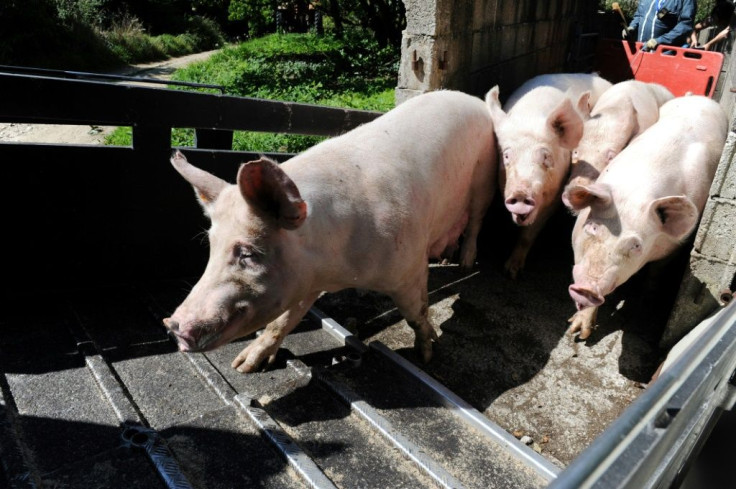Deadline Looms For French Pig Farmers On Castration Choice
For centuries, male pigs have been castrated to make them less aggressive and to ensure quality control. But French farmers are facing a deadline to end a painful practice that few consumers are still willing to accept.
From January 2022, surgical castration will require anaesthesia, a complicating factor for the procedure that will inevitably increase production costs.
Several countries in Europe have already outlawed, or historically avoided, surgical castration which lets producers maximise the size of a pig before slaughter.
Yet it remains standard for the vast majority of French pig farmers, with nearly 10 million piglets subject to castration each year.
They say it's necessary for increasing fat content in meat and avoiding "boar taint," a fetid odour that comes from compounds pigs begin producing when they reach sexual maturity.
Often compared to dirty gym socks or urine, the smell can overwhelm the taste of cooked pork, making it unpalatable for most people.
One alternative is to avoid castration altogether and slaughter pigs before they reach maturity.
But while a growing number of French producers are embracing that approach, meat processors show no signs of changing their ways.
"We absolutely want to put quality meat on the market," Thierry Meyer, head of pork operations at the huge French meat processing group Bigard, said at a press conference last month.
"Bigard will continue to castrate" in response to quality demands from its clients, he said.
Pork from castrated pigs is even mandatory for some French specialities like cured Bayonne ham, further hindering efforts to move away from the practice.
"We're heading toward the solution of local anaesthetic injections between the testes," Valerie Courboulay, a researcher at the pork industry's IFIP technical institute, told AFP.
"The operation is not very difficult in itself," she said, and the agriculture ministry is preparing a detailed document on the approach.
But that would still fall short of activist demands for better animal welfare.

"It won't be enough to totally avoid the pain" and "will be very difficult to reconcile with production rates" sought by breeders, said Sandy Bensoussan-Carole of the French NGO Welfarm.
"Who is going to check that these products are actually bought and used?" she added.
For Jean-Jacques Riou, a farmer in the Finistere region of Brittany, the planned anaesthesia protocol is "absurd".
He leads an association of breeders advocating an end to castration pure and simple, saying it would save time and money, since "whole" pigs tend to require less feed.
And farmers would no longer have to carry out a stressful and potentially traumatising procedure for both pigs and humans.
"It's the future for everyone's well-being," Riou said.
But for now he continues to castrate, since most processors in the Culture Viande industry federation refuse to accept pigs that could produce off-putting boar taint.
Only 2.8 million piglets went uncastrated in France in 2019, just a fraction of the 23.5 million produced overall.
Many growers are pushing to have castration allowed only when required for specific products, instead of being effectively imposed by major clients.
That position is shared by the AVPO and SNGTV associations of pork industry veterinarians, given the complications of implementing anaesthesia operations, AVPO president Melanie Liber said.
Patrice Drillet, head of the Cooperl cooperative in western France, says his group's 2,700 members have already stopped castrating altogether.
"This subject is over for us," Drillet said at a press conference in May, but "some people are allergic to change".
Around 20 employees at Cooperl processing plants use a surefire method to weed out any funky males -- their noses. It claims the problem affects just one to two percent of the total.
Other studies show the risk of boar taint in five to ten percent of males, down from over 20 percent previously thanks to genetic selection and diet improvements.
For Riou, the question for officials is clear: "The ministry is going to have to choose between satisfying thousands of breeders, or a dozen slaughterhouses."
© Copyright AFP 2024. All rights reserved.





















